Read carers' experiences
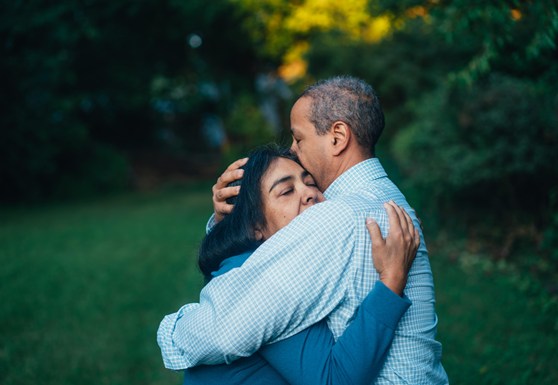
Andrew's story
"I have been caring for my wife, Sue, for 20 years. She has final stage secondary progressive Multiple Sclerosis.
"Sue’s blood pressure goes up and down like a yo-yo. I use a blood pressure monitor to keep track of it, and get her treatment when she needs it.
"I started using the blood pressure monitor a few years ago when she was given a trial for a blood pressure medication. I wanted to monitor whether it was working and after the trial I proved it wasn’t making a difference, so using the monitor has helped reduce the amount of medication Sue takes.
"I also use a SAT monitor routinely three or four times a day to measure her oxygen levels. Low oxygen can be an indicator of congestion in the lungs. When this happens I can give her a chest massage to encourage the lungs to expand to help her breathe more easily and make her more comfortable.
"Using technology to keep track of her health means that we can manage Sue’s condition at home, and get her treated more quickly without necessarily having to visit a GP.”

Graham's story
"Last year my wife and I wanted to take a big trip, but it presented a huge problem. Our 30-year-old son Philippe lives with us at home so we can make sure that he takes his medication. He was diagnosed with epilepsy when he was 16 and even with us living under the same roof it’s not always easy to know that he has taken his medication.
"Technology has given us peace of mind and he doesn’t get annoyed with us constantly asking.
"Due to his epilepsy and the side effects of the medication, Philippe has trouble remembering things. He has missed doses of his medication frequently over the years. If he misses a dose the consequences are serious - he will almost certainly have a major seizure. But for 24 hours after this he isn’t really himself and can miss other doses causing more seizures and he can get himself into a bit of a mess for a few days.
"In 2016 we wanted to see our daughter in Australia, but we worried about leaving him on his own. I found this automated pill dispenser, which alerts us via text message or email if Philippe has taken his medication. If the message doesn’t come through, we can ring him up and remind him.
"It gave us a huge amount of reassurance and allowed us to go on holiday for a month. We use the medication dispenser all the time now and, to be honest, I wish we’d found it years ago."
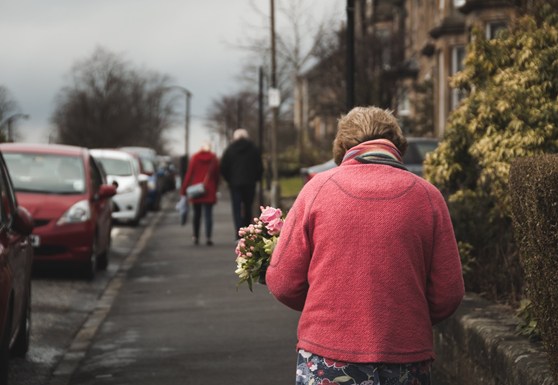
James' story
"I was 25 when I moved back in with Mum who was suffering with dementia. I left my job as a strategy consultant to care for her with my brother.
"Mum got day and night mixed up and we’d find her packing suitcases for an imaginary holiday at 3am, or getting dressed for a lunch date at 4am.
“I remember being so worried that I would tie a string to Mum’s bedroom door and put it on my finger so I’d know if she left her room in the night!”
"We were always listening out for her and it made it hard to sleep. A family friend suggested we try a bedtime monitor, which ended up being a real life saver. Knowing we could be with Mum in seconds if she needed us in the night meant we could all sleep better.
"One of the first things we bought to help Mum was a large digital clock. Mum started to miss appointments because she was confusing days, dates and times. Dementia clocks hadn’t been invented, but this one did help and it responded to radio signals and changed time automatically when the clocks changed so Mum always knew the correct time. However, as her dementia progressed she became unable to interpret the hands of the clock. Now we have developed our own dementia specific dual display clock that can really help those living with dementia to follow the time as their dementia progresses.
"When I was at work, or away from home with friends, I would worry how Mum was doing and couldn’t really relax and enjoy myself. Sophisticated home monitoring systems weren’t easily available a few years ago (they are now), but I did manage to rig up my own CCTV camera linked to my mobile phone, which gave me reassurance when I wasn’t at home.
"Mum declined steadily over the five years I cared for her and she died peacefully at home in 2011. Afterwards, I recognised how much I’d learned from other carers. This led me to launch Unforgettable in 2015, it is a website that brings together life-changing dementia products to help those with dementia to do the things that we take for granted, together with practical advice and a supportive community. Ultimately, I discovered how passionately I hold the belief that it is possible to cope better with dementia and how motivated I was to help other people discover the products and services I wished I knew about."
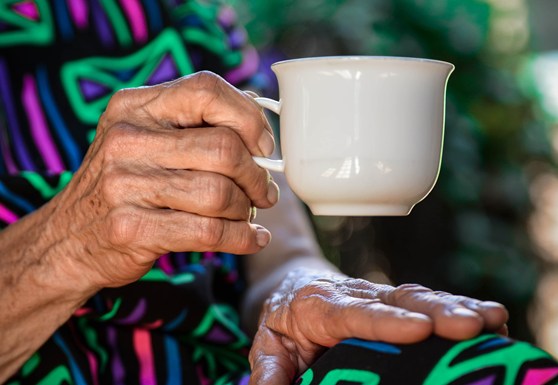
Niki's story
"Before I got the monitoring system, I never knew if I would come home and find my husband on the floor covered in blood. Matthew, has a progressive genetic disorder called myotonic dystrophy. He started to present symptoms in his mid-twenties, but in the last couple of years things have deteriorated. I am his sole carer and he can’t be left on his own or leave the house very easily.
"This situation wasn’t part of the life plan, but technology allows me to keep working from home and gives Matthew some choice in his day.
"We use a monitoring system of cameras and motion sensors that alerts me of his movement on my phone. I can have a look and see if he’s just turning over or if he needs something. It allows me to be downstairs and work in the kitchen knowing that he’s OK upstairs. I can also pop out for a pint of milk now without worrying.
“The system helps to manage my stress levels and enables me to stay in work, which would be very difficult if we didn’t have it.”
"We also have a video door system that goes to our phones. This allows Matthew to see who’s at the door, but also talk to them if it’s someone he knows and tell them to come in around the back. If he doesn’t want to see someone, it gives him some autonomy and choice, which means a lot to him as most of his day is out of his control.
"The internet allows Matthew to keep up with his interests. Before he might have spent a few hours in a book shop, now he can look for books online. He also loves history and used to go to museums, but as it is almost a military operation to leave the house, he now goes to online forums where he can still engage about things that interest him and express an opinion. Otherwise his whole life becomes about the condition and he is so much more than that."

Olga's story
"When I first heard about Carers UK’s Jointly app, I was juggling full-time work with caring for my parents. I was living in London – 170 miles away from their home in Staffordshire. It was a complicated and stressful situation.
"My mum has a range of conditions, including osteoporosis and arthritis. My dad had been caring for her, until 2015 when he was diagnosed with lymphoma and needed care himself. My siblings and I tried to coordinate it between us, taking turns to travel to their home to help around the house, cook meals and take them to appointments. Jointly was an excellent way of making sure we had all the information we needed in one place.
“We only had to enter the information once and all of us had access to it. Up until then we’d been trying to coordinate everything through email, phone calls and trying to share calendars.”
"Each time one of us took mum or dad to an appointment we would make notes in Jointly. The medication list meant we all had up-to-date information to share with the GP – which was essential when dad was prescribed aspirin, which he wasn’t allowed to have whilst on his cancer drugs.
"Being able to look after my parents has been really important to me. I wanted to return the care and love they gave me during my childhood. After dad passed away in 2016, my siblings and I have continued to share the care for mum, and Jointly helps us do that."
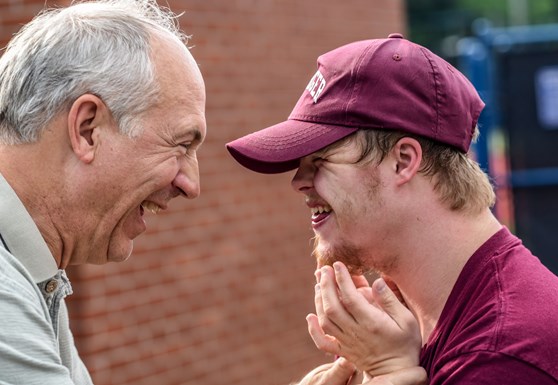
Philippa's story
"25 years ago my son, Simon, made the move from a small group home into his own house, because he wanted to be more independent. Simon has brain and learning disabilities. He can’t read or write, he can communicate verbally but isn’t always clear. In an emergency he tends to freeze.
"Before we got Telecare we were worried about whether Simon would be safe especially at night when he prefers to be on his own. Simon’s Telecare includes door, bed and curtain sensors, electronic prompts and fire and flood alarms. We also installed cameras, but we don’t want to invade his privacy, so don’t watch them much.
"A few years after we installed the system, some local boys set fire to his wheelie bin, which spread quickly to the conservatory. The alarms and cameras were all on and communicated the problem immediately to the call centre. By the time we got there, the fire brigade, the police and Simon’s support worker were all at the scene. Due to the cameras we were able to identify the boys as well. I can’t say what would have happened without Telecare. Maybe Simon or a neighbour would have woken up, but maybe not.
"Telecare enables Simon to feel more secure at home. We rarely use the sensors now as he has a good routine and Telecare is part of that routine now. The voice prompts are still useful as they tell him to remember his keys and to lock the door. Simon hasn’t fallen or failed to get up, but we know that if something does go wrong it’s only a press of button to get help. Without Telecare I think we would have to think about a group home or live-in carers, which would limit Simon’s independence.
"Simon also has a phone that has symbols as he can’t recognise numbers. Having it on him when he’s out and about in town is reassuring and the local police are now programmed on his phone incase he is harassed.
"I like the idea of the least restrictive environment for Simon and if having cameras or curtain sensors makes the difference to his independence then, providing he agrees, I think it’s a good idea. Telecare has enabled Simon to become progressively more independent and self-confident, so we don’t use all of the sensors anymore.
"You can’t guard against everything, but with some equipment there is something there – just in case."

Raymond's story
"My wife Carole was diagnosed with Multiple Sclerosis 18 months into our marriage. She needs round the clock care as she has mobility problems. With the help of our daughter, Sarah, I have been her carer for 30 years.
"Before I retired from the building trade, we used a personal alarm with a 24-hour monitoring service. It gave us a lot of reassurance knowing that she only had to press a button to talk to someone if something was wrong. It gave Carole some independence, as the staff at the call centre got to know her and she felt quite safe and secure in the house.
"Now I’m around the house more, we wanted an alarm that came through to me.
“After she fell in the house behind me and I didn’t hear it, I realised how bad my hearing was and the audiology department at hospital suggested a silent alarm.”
"This alarm now comes through to me and alerts me if she is getting up or if anything has happened.
"We also have the smoke alarms connected to it and a vibrating pad that goes under my pillow, so that if during the night I don’t hear the alarm, I’ll feel it. You can also link it to the door or the phone.
"It’s one of the best things we’ve had and it gives me a greater level of freedom, as I’m not tied to the front room waiting to hear her. When spring and summer come, I can go out into the garden and when Carole needs me she presses the button.
"I would recommend it to anyone, it’s not just for my wife - it gives us both peace of mind."
Latest updates
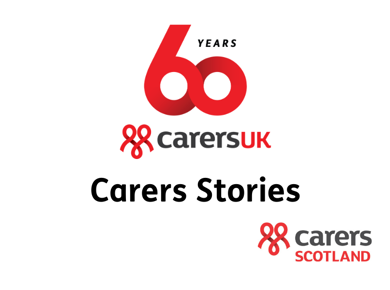
Full Time Caring: A Journey in Mastering Mindfulness - Part 2
To mark Carers UK's 60th Anniversary in Scotland, we are using our platform to share the stories of carers across…

Carers call on MPs to protect future carers’ benefits as they prepare to vote on the Government’s welfare bill
Politicians are being asked to show their support for unpaid carers ahead of the second reading of the Universal Credit…

Carers UK responds to Government statement on proposed changes to the Universal Credit and Personal Independence Payment Bill
It’s important that the Government has listened and made amendments, but should these proposals go ahead, this will be potentially…

Carers UK responds to changes to the Universal Credit and Personal Independence Payment Bill
The Government will make changes to the Universal Credit and Personal Independence Payment Bill ahead of its second reading on…
Got a question about caring?
Every day we hear from people who need help with looking after a friend or family member
Become a member for free
Joining Carers UK is free and takes just a few minutes.


